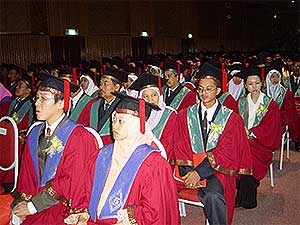Graduate unemployment can be a bad thing. But Bumiputera unemployment can be explosive. The rise in Bumiputera graduate unemployment should worry Malaysians.
Anil Netto’s blog has the following statistics, gleaned from a parliamentary response provided to PKR Member of Parliament, William Leong in 2009:
In 2004, there were 4,594 unemployed graduates of whom 163 were Chinese, 207 were Indians and 4,060 were Malays;
In 2005, there were 2,413 unemployed graduates of whom 31 were Chinese, 70 were Indians and 2,186 were Malays;
In 2006, there were 56,750 unemployed graduates of whom 1,110 were Chinese, 1,346 were Indians and 50,594 were Malays.
In 2007, there were 56,322 unemployed graduates of whom 1,348 were Chinese, 1,401 were Indians and 49,075 were Malays.
In 2008 (as of June) there were 47,910 unemployed graduates of whom 1,403 Chinese, 4,694 Indians and 41,813 were Malays.
This more or less tallied with the 47,733 active graduate registrants on the Malaysian Labour Exchange in June 2008.
By March 2009, Najib was talking about 60,000 unemployed graduates. This was more or less in line with the 57,701 graduate registrants on the Exchange in March 2009.
By October 2009, we were looking at 81,046 active graduate registrants on the Labour Exchange – and another 70,747 active registrants who are diploma holders.
In 2010, it was reported that 30,000 graduates could not find employment six months after graduation.
Malaysia’s world class education system appears to have produced unemployable graduates with 90% of them bumiputeras.
Malaysia’s public sector historically performed the function of absopring Bumiputera graduates but with a bloating public sector but with critical shortages in skilled areas (doctors, nurses, science and mathematics teachers) and Malaysia’s fiscal position reaching worrying stage, this option is now limited.
The culprit appears to be Malaysia’s public universities. In 2006, 70% of graduates from public universities were unemployed with Universiti Teknologi MARA — the universiti exclusively for Bumiputeras — contributing the highest.
William Leong also attributes Bumiputera graduate unemployment to mismatch – where public universities are not being in tune with industry needs and/or producing graduates that are not in demand.
Retraining them have produced dismal results but at a tremendous cost. Dr. Lim Teck Ghee of CPI cites that approximately RM500 million a year is spent on retraining these graduates.
It is the fervent hope that these unemployed Bumiputera graduates correctly identify Barisan Nasional’s policies and themselves for their predicament and not innocent bystanders such as the non – Malays.
[Editors note: UMNO and and its new partner PERKASA, have perfected the art of blaming non-Malays, especially the Malaysian Chinese community and sometimes, Western powers for the ills of the Malay community.]Thousands more Bumiputeras are expected to graduatein the short and medium term. The Malaysian economy is expected to perform at a stable but mediocre 4.6% to 5% over 2011-2020. It is unclear if there will be sufficient number of jobs created for them or if these graduates will be able to compete for the jobs that are available in the private sector.
It is left to be seen how this rising tide of unemployable Bumiputera graduates will affect Barisan Nasional and Malaysia’s future.
[Editor’s note: This is not to suggest that Bumiputera graduates are not competent but merely to highlight that a large majority of them – 90% – have difficulty finding employment.] [Correction (16-02-2012) – the above should read that 90% of those who have voluntarily registered as unemployed in a government database are Bumiputeras] Facebook
Facebook  Twitter
Twitter  Soundcloud
Soundcloud  Youtube
Youtube  Rss
Rss 